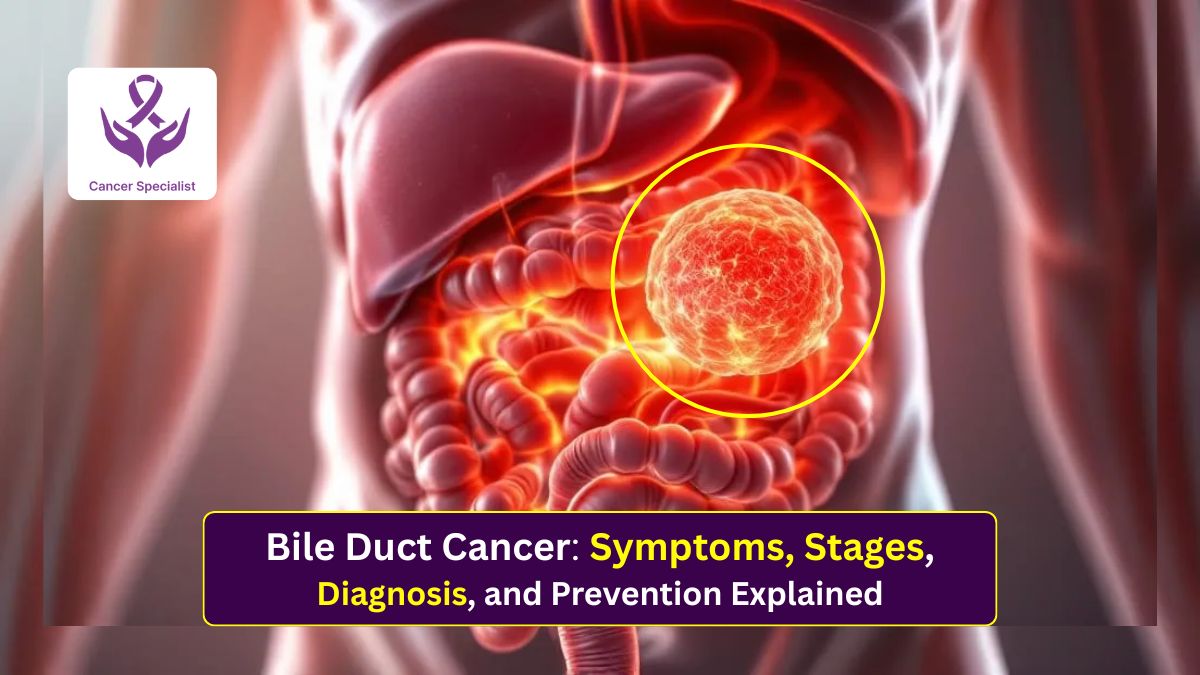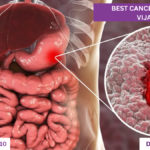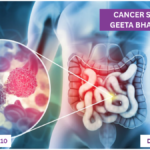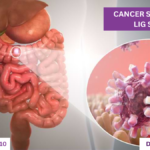Table of Contents
ToggleEverything You Need to Know About Bile Duct Cancer: Signs, Stages, and Care
When it comes to serious health concerns, early awareness and expert care make all the difference. If you or a loved one is worried about bile duct cancer, seeking guidance from Dr. Suyash Agrawal, the best cancer specialist in Indore, can be a ray of hope. This article walks through what bile duct cancer is, its symptoms, how fast it spreads, what happens in the last stage, diagnosis, and prevention — with emphasis on the role of the Best Cancer Specialist in Indore Dr. Suyash Agrawal in ensuring timely, effective treatment.
What is Bile Duct Cancer?
Bile duct cancer, also known as cholangiocarcinoma, arises in the bile ducts — the passageways that carry bile from the liver and gallbladder into the small intestine. These ducts are essential for digestion and for clearing waste products. Cancer in these ducts can be intrahepatic (inside the liver), perihilar (where ducts join just outside the liver), or distal (farther down toward the small intestine).
The Best Cancer Specialist in Indore Dr. Suyash Agrawal is highly experienced in treating all types of bile duct cancer, helping patients understand which category their disease falls into and tailoring treatment accordingly.
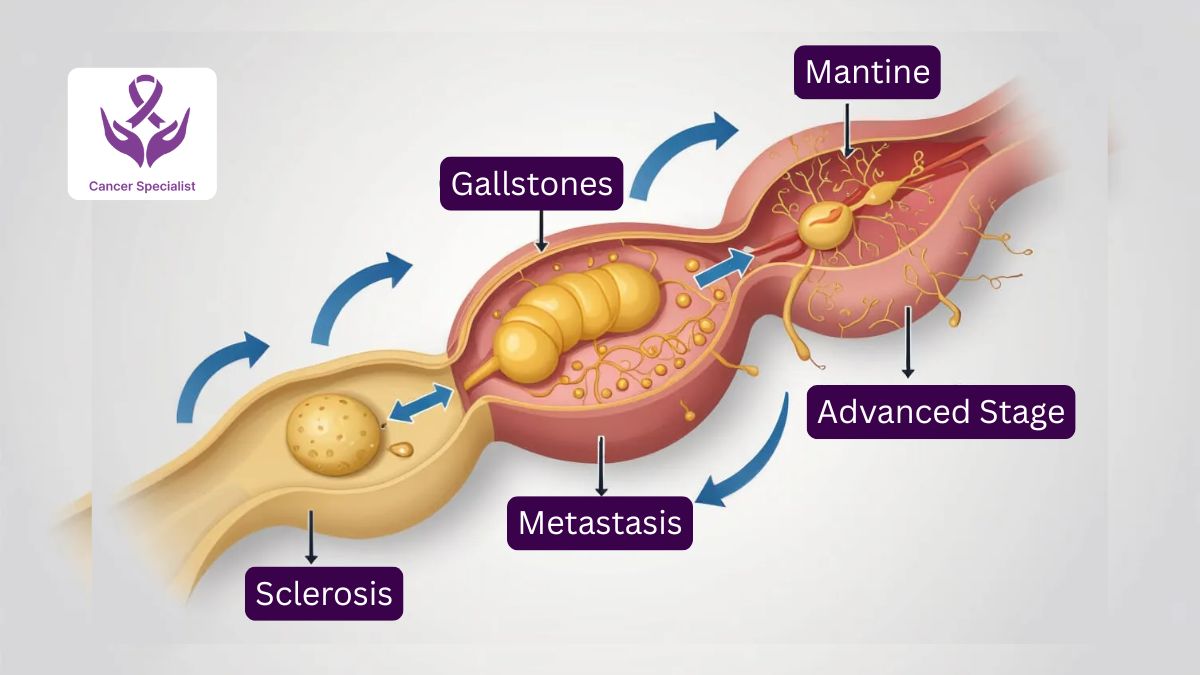
What are the Symptoms or Signs of Bile Duct Cancer?
Symptoms often don’t appear until bile duct cancer has advanced. However, there are some warning signs to watch for:
-
Jaundice: When skin and whites of the eyes turn yellow due to bile duct blockage.
-
Itchy skin, because of elevated bilirubin in the bloodstream.
-
Dark urine and pale or clay-colored stools, from bile not reaching the intestine properly.
-
Abdominal pain, especially in the upper right side or near the liver area.
-
Unexplained weight loss, loss of appetite, nausea, vomiting, or fatigue.
-
Fever, or general discomfort without a clear infection.
If you notice any such symptoms, getting evaluated by a trusted professional like the Best Cancer Specialist in Indore Dr. Suyash Agrawal is crucial.
How Fast Does Bile Duct Cancer Spread?
Bile duct cancer tends to grow silently and often spreads before it causes significant symptoms. Its speed of spread depends on factors like location, how aggressive the tumor cells are, whether they invade nearby structures (such as lymph nodes or blood vessels), and the patient’s overall health.
For many patients, by the time it’s discovered, the cancer has extended beyond the bile ducts — often into nearby organs or to lymph nodes. That’s why early diagnosis led by authorities like the Best Cancer Specialist in Indore Dr. Suyash Agrawal improves outcomes significantly.
What Happens in the Last Stage of Bile Duct Cancer?
In the final (stage IV) stage of bile duct cancer:
-
The cancer has frequently metastasized — meaning it has spread to distant organs such as lungs, bones, or lymph nodes far from the primary site.
-
Symptoms become more severe and persistent: intense pain, severe jaundice, increased fatigue, weight loss, possibly difficulty eating or digesting.
-
Function of affected organs declines; complications such as obstruction of bile flow, infections (cholangitis), liver failure might occur.
-
Treatment shifts more toward palliative care: focusing on symptom relief, quality of life, and possibly slowing progression rather than cure.
Having access to the Best Cancer Specialist in Indore Dr. Suyash Agrawal at or before this stage helps manage these symptoms effectively and helps patients maintain dignity, comfort, and support.
How is Bile Duct Cancer Diagnosed?
Diagnosis usually involves several steps:
-
Medical history and physical exam: Discuss symptoms, risk factors (like previous liver disease, infections, or bile duct conditions).
-
Blood tests: To check liver function and look for tumor markers such as CA 19-9 or CEA.
-
Imaging studies: Ultrasound, CT scan, MRI, or specialized imaging like MRCP to visualize bile ducts, identify blockages or tumors.
-
Endoscopic or percutaneous techniques: Procedures like ERCP, endoscopic ultrasound (EUS), or percutaneous transhepatic cholangiography may help get biopsy or relieve blockages.
-
Biopsy: Taking tissue samples, analyzing them under microscope, checking for molecular or genetic characteristics. This confirms cancer diagnosis.
An expert like the Best Cancer Specialist in Indore Dr. Suyash Agrawal will guide you through these, ensuring quick, accurate diagnosis and staging which is essential to planning treatment.
Prevention of Bile Duct Cancer
While there’s no guaranteed way to prevent bile duct cancer entirely, risk can be reduced significantly by lifestyle and medical care:
-
Avoid chronic inflammation of bile ducts — manage conditions like primary sclerosing cholangitis or recurring infections.
-
Prevent liver disease: getting vaccinated for hepatitis B, treating hepatitis C, avoiding excess alcohol.
-
Maintain a healthy weight, avoid obesity.
-
Stop smoking, avoid exposure to harmful chemicals.
-
Regular monitoring if you have risk factors (e.g. bile duct cysts, liver flukes, congenital bile duct abnormalities).
If you are at risk, consult with the Best Cancer Specialist in Indore Dr. Suyash Agrawal, who can advise on monitoring, early detection strategies, and lifestyle adjustments tailored for your health situation.
Conclusion
Bile duct cancer is a serious disease with a tendency to stay silent until advanced. Recognizing symptoms early, understanding how fast the cancer spreads, knowing what happens in later stages, and opting for accurate diagnosis are all critical. Prevention and reducing risk play an essential role too. When facing such a condition, choosing an expert in the field is vital — the Best Cancer Specialist in Indore Dr. Suyash Agrawal offers the clinical expertise, diagnostic precision, and compassionate care needed to navigate this difficult journey.
Early consultation and care can make a significant difference. If you have concerns or symptoms, do not wait: reach out to Dr. Suyash Agrawal to ensure you get the right tests, treatment options, and support you deserve.

